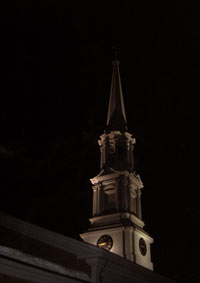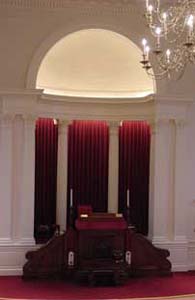MP3 audioFirst Reading: - from Psalm 51
Have mercy upon me, O God, according to thy loving kindness: according unto the multitude of your tender mercies blot out my transgression.
Wash me thoroughly from my iniquity, and cleanse me from my sin.
Against thee, and thee only, have I sinned, and done this evil in thy sight.
Behold, thou desires truth in the inward parts: and in my hidden being You shall make me to know wisdom.
Purge me with hyssop, and I shall be clean: wash me, and I shall be whiter than snow.
Make me to hear joy and gladness; that the bones which You have broken may rejoice.
Turn away your face from my sins, and blot out all my iniquities.
Create in me a clean heart, O God; and renew a right spirit within me.
Cast me not away from thy presence; and take not thy holy spirit from me.
Restore unto me the joy of thy salvation; and uphold me with your free spirit.
For thou desires not sacrifice; else would I give it: thou delights not in burnt offering.
The sacrifices of God are a broken spirit: a broken and a contrite heart, O God, thou will not despise.
Second Reading: — from “Cry Out in Your Weakness” by Rumi (Coleman Barks, translator)
A dragon was pulling a bear into its terrible mouth.
A courageous man went and rescued the bear.
There are such helpers in the world, who rush to save
anyone who cries out. Like Mercy itself,
they run toward the screaming.
And they can’t be bought off.
If you were to ask one of those, “Why did you come
so quickly?” he or she would say, “Because I heard
your helplessness.”
Where lowland is,
that’s where water goes. All medicine wants
is pain to cure.
And don’t just ask for one mercy.
Let them flood in. Let the sky open under your feet.
Take the cotton out of your ears.
Push the hair out of your eyes.
Let the wind breeze through.
Tear the binding from around the foot
of your soul, and let it race around the track
in front of the crowd. Loosen the knot of greed
so tight on your neck. Accept your new good luck.
Give your weakness
to one who helps.
Crying out loud and weeping are great resources.
A nursing mother, all she does
is wait to hear her child.
Just a little beginning whimper,
and she’s there.
Cry out! Don’t be stolid and silent
with your pain. Lament! And let the milk
of loving flow into you.
Be patient.
Respond to every call
that excites your spirit.
Ignore those that make you fearful
and sad.
Sermon: “Being Wrong”
At long last, after 31 years of ordained ministry (and I was told on Thursday that there are now only five of us in over 1,000 Unitarian Universalist ministers who have been in their parish for 31 years), finally, I can give a sermon I feel genuinely qualified to address – “Being Wrong.” I can’t begin to tell you the research I’ve put into this topic. It goes back a long way and continues right up to the present day.
By wrong, being misguided, being mistaken; all of these acknowledgements of errant human judgments lie at the very heart of the high holy days in Judaism. As Tom told us, beginning with the Jewish New Year, Rosh Hashanah and moving to Yom Kipper, the day of Atonement, the Jewish community starts the new year with self-reflection, setting aside time for contrition, repentance and a commitment to repair what is broken in relationships and in the world. It as a spiritual discipline that all human being would do well to practice.
But the Jewish high holy days were not the original inspiration for this sermon.
An incident occurred this summer. I was in a high state of “agita,” stress and distress when I received a long-distance phone call from one of my dearest friends. Halfway through our conversation, she said something that was so inappropriate, so unhelpful, that I wanted to hang up on her.
The next day, a relative called. Again, saying something different, but every bit as disturbing. And I found myself having to restrain myself from slamming the receiver down, mid-sentence.
Later that evening, I was talking to another friend. And what a surprise! What she was telling me was unbelievably aggravating, and only a lifetime of friendship kept me on the line.
I couldn’t help but notice that I was furious with almost anyone I was talking to (and even with some who hadn’t said a single word to me.) Surely all these people I loved dearly were not in some vast conspiracy to day annoying things?
It dawned on me, with rare clarity, that my mind was giving me inaccurate information. What was wrong was the way I was perceiving reality.
Now this was a genuine crisis. Like most Unitarian Universalists, I have been taught that we can rely of the “integrity of our own minds.” We depend on our own capacity to judge true from false, right from wrong. We may even convince ourselves that we are discerning, rational, sensitive, observant and committed to clear thinking. It was a shock for me to discover that apparently none of these intellectual qualities were operational under stress conditions.
Now I’m hoping that some of you, at this point, are asking, “If the preacher this morning openly admits that she is wrong a lot, why am I listening to anything she has to say?”
Should we go immediately to the closing hymn? Instead, I would like to speak in defense of all of us who are constantly and habitually wrong. Those who occupy a pulpit, or who stand in front of a classroom, those who have been working with family and friends, those who have been wrong, who now sit in pews.
First, a Thesaurus definition: (see what the following constellation of words bring to your mind) “error, delusion, misjudgment, mistake, inaccuracy, misunderstanding, failure, misstep, blunder, stupidity, misconception, stumble.”
I don’t think many of you are having a difficult time with the definition. But how does being wrong affect our spiritual lives? We Unitarian Universalists don’t believe in original sin. We don’t believe that human beings are inherently evil. But we nevertheless might benefit from confessing that we oft times “miss the mark.” And in case you’ve forgotten a few of the details; I have compiled an “Error Inventory.”
· Did you ever accept a job that you thought would be perfect – only to discover later that it wasn’t?
· Did you ever hire someone you were sure would do a great job – and then they didn’t?
· Have you ever been blinded by infatuation and love?
· If you have helped to raise children, did you hope you could “do it right”?
· Did you believe (as I did) that there were weapons of mass destruction in Iraq?
· Have you taken a wrong turn and then gotten really, really, lost?
· Have you neglected to write a thank you, send a note of bereavement or to offer congratulations?
· Have you argued passionately with a friend, or a spouse, or a relative only to discover later that you were completely wrong?
· Do you need any more questions?
If you have been wrong a lot in your life, allow me to offer my congratulations. It means you are fully human. It means you are out here with the rest of us – trying, failing and in need of help. There aren’t any other kinds of people than ones who are “wrong” frequently.
Rumi is a little more upbeat on the condition of error than I am. He wrote from the Sufi tradition – the mysticism of Islam. “Failure is the key to the kingdom within.” So why don’t we embrace our misconceptions? Celebrate our shortcomings? Welcome our misjudgments? Because our own track record, our own errors in judgment and in practice make us uncomfortable. Mistakes usually make us feel vulnerable and afraid.
It is so much easier to focus on what is wrong with our neighbor, with our boss, with our politicians, with our spouse, with our fate, our luck and our circumstances!
Some one recently summed up the prejudice against other people’s misjudgments: “If I think it, it is true and right. If you think something, it is fake and wrong.” Pretty neatly put!
Religious wars have been fought on this conviction. We human beings are easily deluded. Jesus, in one of his rare written records of sarcasm, is quoted as saying, “Why do you focus on the splinter in your neighbors eye, when you yourself are blinded by a plank, a log, a piece of lumber in your own eye?”
Repentance is in order, now and always. Not just for the Jewish people in their days of contrition, but also for Unitarian Universalists. We are wrong a lot. What would repentance in the free church look like? I suggest we go with our strengths.
First, skepticism – only now directed not at the dogmas and rituals and doctrines of the orthodox and the fundamentalists. We need to harbor an abiding skepticism about what our own minds tell us.
Are you convinced that the world is coming to an end?
Are you certain that there is very little joy awaiting you?”
Are you afraid that you don’t have the strength to meet the challenges ahead?
Do you think that you’ve made too many wrong turns in your life?
Be skeptical. Hold your ideas and pronouncements with a light touch. Better yet, let go of your fixed and stubborn ideas about what is real and what is possible.
The Taoist, Chinese tradition teaches, “Imagining a bad outcome, adopting a fixed negative idea about what is happening – those fixed ideas are hedges against the unknown. By nature, they are oppressive and destructive. Maintaining them is exhausting.” The wisdom traditions say it is better to stay open and curious, skeptical that any of us have a clue about what will happen. We need to admit that we don’t know.
My second piece of advice for a Unitarian Universalist repentance is to take action. Action which will lead us in the direction we want to go.
This summer, on retreat, I heard someone describe two directions on a spiritual path that we can chose to travel upon – either towards separation or towards love. The speaker described the path of separation as that of pride, ego, being different (being especially cursed or especially blessed) being better, or worse than others, thinking of yourself as being alone, isolated or living apart.
He described another way, another direction, towards love, towards hope, towards unity and togetherness. Identifying with the struggle of all souls – believing yourself to be fundamentally no different than any other loved child of God.
I don’t completely understand these two directions. I know that I am tempted to wander onto the path of separation and estrangement all too frequently. But in worship, and our lives, we can repent. We can ask to be turned, again and again, in the direction of love. And we can ask that our lives be used in the service of love, rather than using our energy to divide and separate, to place ourselves higher or lower than our fellow human beings.
After exercising our skepticism, and actively turning in the direction of love, there is one final act of contrition that I believe Unitarian Universalists can take refuge in. I heard it once in a fragment of song (or a piece of poetry.) It can be summarized in these few words, “Even when it seems that you’ve done everything wrong, it can come out right in the end.” The last practice is to relax and to know that being wrong can take you where you need to go on your path to God, to truth, towards peace. This morning in Zen meditation in the Chapel, David Rynick described this as a stance of friendliness.
I close with a story narrated by Rabbi Lawrence Kushner. If any of you are feeling a little sleepy about now, you might want to wake up and pay attention.
“The richest man in town was sleeping in his pew, as usual, through Sabbath morning services. Every now and then, he would almost wake up, trying to get comfortable on the hard wooden bench, and then sink back into a deep sleep. One morning he awoke just long enough to hear the chanting of the Torah verses from Leviticus in which God instructs the children of Israel to place twelve loaves of bread on a table in the ancient wilderness tabernacle.
When services ended, the wealthy man woke up, not realizing that all he had heard was the Torah reading about how God wanted twelve loaves of bread. He thought that God had come to him in his sleep and had asked him personally to bring twelve loaves of chalah to God. The rich man felt honored that God should single him out, but he also felt a little foolish. Of all the things God would want from a person, twelve loaves of bread did not seem very important. But who was he to argue with God? He went home and baked the bread.
Upon returning to the synagogue, he decided the only proper place for his holy gift was alongside the Torah scrolls in the ark. He carefully arranged the loaves and said to God, “Thank You for telling me what You want of me. Pleasing You makes me very happy.” Then he left.
No sooner had he gone than the poorest Jew in the town, the synagogue janitor, entered the sanctuary. All alone, he spoke to God. “O Lord, I am so poor. My family is starving; we have nothing to eat. Unless You perform a miracle for us, we will surely perish.” Then, as was his custom, he walked around the room to tidy it up. When he ascended the bimah and opened the ark, there before him were twelve loaves of bread! “A miracle!” exclaimed the poor man. “I had no idea You worked so quickly! Blessed are You, O God, who answers our prayers.” Then he ran home to share the bread with his family.
Minutes later, the rich man returned to the sanctuary, curious to know whether or not God ate the bread. Slowly he ascended the bimah and opened the ark, and saw that the bread was gone. “Oh, my God!” he shouted, “You really ate my bread! I thought You were teasing. This is wonderful. You can be sure that I’ll bring another twelve loaves—with raisins in them too!”
The following week, the rich man brought a dozen loaves to the synagogue and again left them in the ark. Minutes later, the poor man entered the sanctuary. “God, I don’t know how to say this, but I’m out of food again. Seven loaves we ate, four we sold and one we gave to charity. But now, nothing is left and, unless You do another miracle, we will surely will starve.” He approached the ark and slowly opened its doors. “Another miracle!” he cried. “Twelve more loaves, and with raisins too! Thank You God. This is wonderful!”
The bread exchange became a weekly ritual that continued. . . And, like most rituals that become routine, neither man gave it much thought. Then, one day, the rabbi, detained in the sanctuary longer than usual, watched the rich man place the dozen loaves in the ark and the poor man redeem them.
The rabbi called the two men together and told them what they had been doing.
“I see,” said the rich man sadly, “God doesn’t really eat chalah.”
“I understand,” said the poor man, “God hasn’t been baking chalah for me after all.”
They both feared that now God would no longer be present in lives.
Then the rabbi asked them to look at their hands. “Your hands,” he said to the rich man, “are the hands of God giving food to the poor. And your hands,” said the rabbi to the poor man, “also are the hands of God, receiving gifts from the rich. So you see God still can be present in your lives. Continue baking and continue taking. Your hands are the hands of God.”




